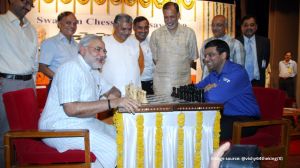India’s first Sars patient is in Goa
The dreaded Sars (Severe Acute Respiratory Syndrome) is finally here. India’s first confirmed Sars case came to light today when Goa Ch...

The dreaded Sars (Severe Acute Respiratory Syndrome) is finally here. India’s first confirmed Sars case came to light today when Goa Chief Minister Manohar Parrikar announced in Panaji that Prashil Varde, a 32-year- old marine engineer, was infected with the disease.
He probably caught the disease during sojourns in Hong Kong and Singapore in the last week of March. He was in Mumbai on March 30 and 31 before leaving for Goa.
Varde had actually been discharged from Goa Medical College (GMC) hospital after ‘‘recovering’’ on April 12 but was brought back late Wednesday night from his Dabolim residence after his blood samples tested positive at the National Institute of Virology (NIV), Pune.
| TRACKING PRASHIL VARDE | |
|
• Varde (32), the country’s first confirmed SARS case, is a marine engineer. He was at sea for the last eight months. In Hong Kong in March, he later took the sea-route to Singapore. |
Dr A C Mishra, officer-in-charge, NIV, said the GMC had sent urine, blood samples and a throat swab to NIV’s microbial containment facilities. The tests were conducted on April 14 and results confirmed positive for SARS on April 16.
‘‘Worldwide there are few recognised tests to confirm the corona virus which has caused the SARS epidemic,’’ Mishra said. His team conducted a test following WHO specifications with a critical ingredient (the primer) imported from Germany.
Mishra said Varde carried the virus but had no symptoms of the killer pneumonia, except a high fever. Parrikar said Varde had now recovered.
Parrikar said he was admitted with his wife, who was travelling with him. Other members of the Varde family volunteered to say in an isolation ward.
In Mumbai, Director General for Public Health Subhash Salunke said, as a precautionary measure, the government was trying to track down everyone who might have met Varde. A team of BMC’s medical officers was deputed to examine the people who came in touch with the patient. Varde met several friends and relatives during his stay in Mumbai. Salunkhe, however, said Mumbai need not worry. ‘‘He showed symptoms of Sars only on April 8 in Goa. This means the disease was in incubation period when Varde was in Mumbai. The chances of others geting affected with the disease at this stage is rare,’’ he said.
Though officials at the Union Health Ministry in New Delhi said adequate measures have been taken, nobody seemed to have an answer why the patient was discharged in such a hurry.
‘‘The treating doctor said he was afebrile and showed no symptoms. His X-ray showed no pneumonia patches, so the samples were collected and he was advised to remain in home quarantine,’’ said Dr S.P. Agarwal, Director General Health Services.
According to him, ‘home quarantine’ means seven-to-10 days of confinement at home. The patient is free to do his indoor activities but is not allowed any social or buisness interaction.
‘‘The isolated virus from his blood samples fully matched the genetic sequence of the mutated coronavirus,’’ said Dr Agarwal.
Officials said the Union government is in touch with the health officials in the state. ‘‘The health workes and the doctors who were in contact with the patient during his previous stay at the hospital have been advised quarantine and constant monitoring. A two-member NICD team has gone to Goa to establish an epidemiological link,’’ said the DGHS. According to him, the Minister of Health, Sushma Swaraj has been constantly monitoring the situation.
Photos



- 01
- 02
- 03
- 04
- 05




























